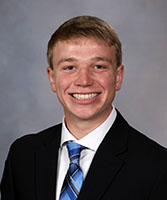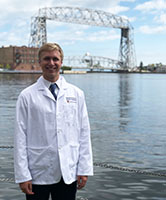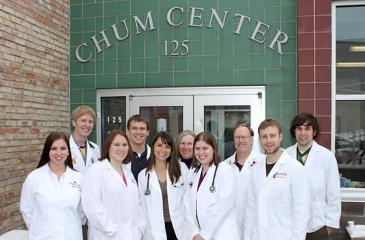Clinic provides free medical access to the underserved populations of Duluth
The student-run HOPE (Health of People Everywhere) Clinic in Duluth recently reopened after closing last fall due to the COVID surge. Located within the Churches United in Ministry (CHUM) Center, the clinic provides free acute care to underserved populations, especially those experiencing homelessness residing at the CHUM Center.
Under faculty supervision, University of Minnesota medical and pharmacy students work together at the HOPE Clinic to complete history and physical examinations, treat acute conditions, help patients with medication reviews and medication education, and refer patients to local clinics for care of chronic conditions.

“We have patients who need to be seen and need medical care. The need for our clinic is evident,” said Zachary Buchholtz, HOPE’s clinic director and a second year medical student. “I'm excited to be back at the HOPE Clinic and help meet our patients’ health care needs that may otherwise go unmet.”
Third year pharmacy student and HOPE’s Pharmacy Director Jacob Noble says, “I am excited that the HOPE Clinic has re-opened so that it can continue to be a place where any and all individuals can be seen for free medical care or get help in setting up an appointment with other professionals in the surrounding area. HOPE Clinic has and will continually be a safe place for all. The executive board and HOPE Clinic volunteers will serve the surrounding community to the best of our ability.”
Students volunteering at the HOPE Clinic gain hands-on health care experience, as well as learn how to manage a clinic and work in interprofessional teams.
“Interprofessionalism in health education is really important, yet interprofessional experiences are sometimes hard to simulate in the classroom,” said Buchholtz. “I've learned more about interprofessionalism volunteering at HOPE than any other activity.”
Noble says that one of the most important things he has learned about working in an interprofessional team is that everybody on the team brings a unique and different set of skills.

HOPE’s pharmacy director
“In order for the team to be successful we must listen to one another and be malleable to potential changes that are proposed by the different team members,” said Noble. “I have appreciated how working interprofessionally has allowed me to become more flexible and open-minded in my approach to practicing patient care.”
Buchholtz says interacting with patients at the HOPE Clinic has also taught him a great deal about social determinants of health.
“It's one thing to listen to lectures about people's access to care and their experience with race and racism, but it's another thing to see it firsthand and experience it,” he said. “Through HOPE, I’ve learned how patients’ situations impact their health. That’s a lesson that I will carry forward in my future career as a physician.”
The walk-in HOPE Clinic is open every Tuesday from 3-5 p.m., and serves patients on a first come first serve system. Raymond Christensen, MD, associate professor in the Department of Family Medicine and BioBehavioral Health, and Tim Stratton, PhD, professor in the Department of Pharmacy Practice and Pharmaceutical Sciences, provide faculty oversight for the clinic.
The HOPE Clinic is an approved part of the interprofessional education curriculum at the University of Minnesota. The HOPE Clinic experience is typically a two-year long commitment and allows many opportunities for students to debrief in interprofessional teams on the experience.



